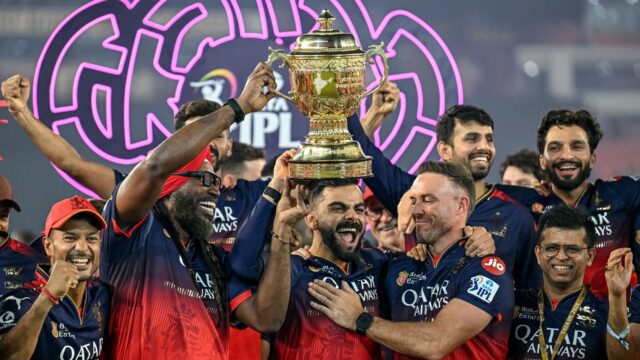The Royal Challengers Bengaluru (RCB) have long been recognised for their explosive batting lineup. Yet, their bowling has often been viewed as a significant weakness, subject to biting criticism over the years. However, on a momentous Tuesday night at the Narendra Modi Stadium, history was made not by the batters, but by the bowlers, as RCB secured their first-ever title after an 18-year wait.
Previously, RCB had experienced heartbreak in three finals (2009, 2011, and 2016), and anticipation was rife that the batters would erase those painful memories. The stage was set for them to perform unencumbered by a target. But the Punjab Kings came well-prepared, wielding a determined bowling attack that kept RCB in check. The result was a challenging total of 190/9 in 20 overs, which felt par at best given the occasion.
As the Punjab batting lineup took to the crease, RCB bowlers, watching from the dugout—and later stepping onto the field—were determined to deliver a counterattack. The pace bowling trio of Bhuvneshwar Kumar (2 wickets for 38 runs), Yash Dayal (1 for 18), and Josh Hazlewood (1 for 54) executed a disciplined bowling strategy that prevented Punjab’s free-stroking batsmen from finding their rhythm. By maintaining tight lines and lengths, they stymied any early aggression from Punjab, forcing them into a more conservative approach.
The bowlers mirrored the tactics employed by Punjab’s bowlers, opting for short, well-placed deliveries and skillfully varying their pace to disrupt the batsmen’s timing. Despite early optimism, both Punjab openers, Priyansh Arya and Prabhsimran Singh, struggled to score freely, with the only bright spot being Josh Inglis, who managed to inject some energy into the innings.
As pressure mounted, Punjab’s batsmen shifted gears, needing to accelerate their scoring rate. RCB captain Rajat Patidar made a crucial move by introducing veteran all-rounder Krunal Pandya into the attack. This proved to be a turning point, as Pandya delivered a brilliant spell—taking 2 wickets for only 17 runs over four overs. He dismissed the key batsmen Prabhsimran Singh and Josh Inglis, effectively swinging the momentum sharply in RCB’s favor.
Virat Kohli, RCB’s stalwart, contributed to the final in a fashion that will leave fans wanting more. Battling against a disciplined Punjab bowling attack that seldom offered loose deliveries, Kohli’s innings was an uphill battle. He managed a laborious score of 43 runs off 35 balls, striking just three boundaries. Though he faced challenges reminiscent of a similar struggle in the previous T20 World Cup final against South Africa, he ultimately emerged on the victorious side.
Amidst the tension, a nod of appreciation is warranted for Jitesh Sharma and Liam Livingstone, who bolstered Punjab’s total and made it competitive. Jitesh’s rapid-fire 10-ball knock of 24 runs, combined with Livingstone’s explosive 15-ball contribution of 25 runs, proved crucial in setting a challenging target for RCB to chase down. Their efforts highlighted the thin margins that often determine the outcomes of T20 matches and the importance of every run scored in these high-stakes situations.







